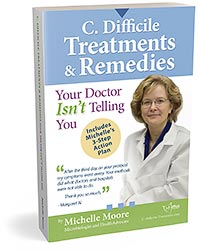Taking an effective, targeted probiotic can play an important role in supporting C. diff. recovery. Since C. difficile often takes hold when the gut microbiome is thrown out of balance, restoring that balance is key. But with so many options on the market, finding the best probiotic for C. difficile can feel overwhelming.
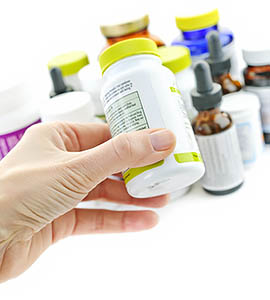
Taking a targeted probiotic can be an important part of your recovery strategy.
If you’ve tried probiotics without seeing results, they probably weren’t True Probiotics
There have been many recent advances in the world of probiotics. And there’s a new class of probiotics that have been used in Europe and around the world for decades with great results. They are new to the United States and they are a game-changer in the probiotic industry.
Beyond gut restoration, these probiotics have been studied for their ability to help defend the microbiome against tough pathogens like C. difficile.
True Probiotics Survive Stomach Acid and Provide Targeted Support
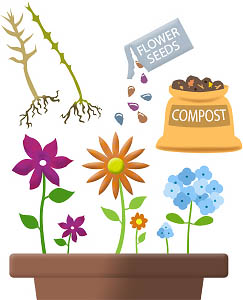
True probiotics benefit your gut microbiome in multiple ways by reconditioning, “pulling weeds” and “tending the soil”.
Most probiotics “reseed” the gut, attempting to replenish the specific probiotic strain or strains you ingest. True probiotics take a different approach and “recondition” the gut. They work like tiny gardeners in your “gut garden”, loosening and fertilizing the soil, which helps the flowers to grow and become strong and healthy.
True probiotics work by making conditions better for your resident healthy gut microbes to grow and flourish. They promote a diversity of microbes, a key indicator of a healthy gut. Restoring the balance of healthy gut microbes also crowds out disease-causing bacteria like C. difficile.
True probiotics target and fight unhealthy bacteria.
Unlike fragile probiotics that try to reseed the gut, the true probiotics below are spore-forming probiotics, meaning they are very hardy and tough. They will arrive in your intestines at 100% potency.
5 Traits of True Probiotics
A true probiotic…
- Can survive in the bottle and through the acidic stomach to reach the intestines at 100% potency1.
- Is a normal resident of the human microbiome and will bind and colonize in every person.
- Has a long history of human use.
- Can tolerate oxygen as well as non-oxygen environments.
- Has a track record of safety and effectiveness.
The Benefits of Bacillus Probiotics

Bacillus are natural probiotic organisms found in the soil and also on fruits and veggies.
For decades, Bacillus probiotics have been used around the world for fighting off intestinal pathogens, antibiotic associated diarrhea and improving immune system function.
Once inside the gut, Bacillus spores start growing. They overhaul the gut by creating essential nutrients and conditions that beneficial species like Lactobacillus and Bifidobacteria need to survive and thrive.
While most Lactobacillus, Bifidobacteria and other probiotics are very fragile, Bacillus probiotics come in a dormant spore form. Bacillus sporebiotics are highly resistant to light, heat and oxygen, making them very stable during shipping and storage. They are a refreshing change as most other “professional grade” probiotics require refrigeration to help keep them alive.
Bacillus Probiotic Targeted C. diff Benefits:
The Evidence Behind Probiotic Support for C. diff
The following points summarize published research on Bacillus strains and how they have been studied for their effects on C. difficile, gut inflammation, and microbiome balance.
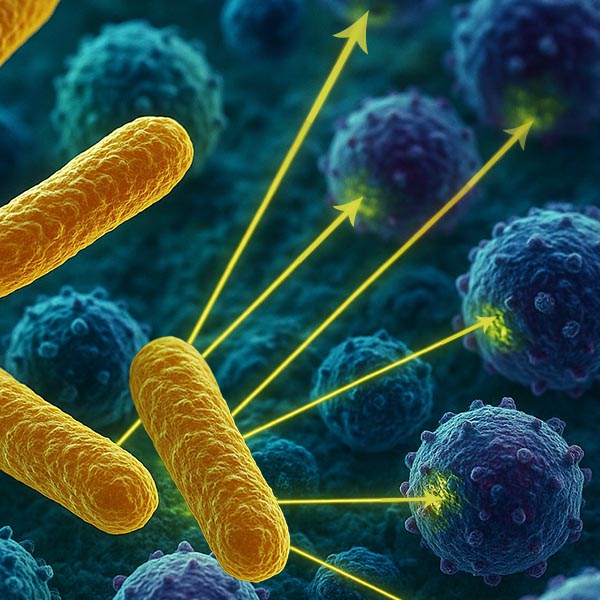
Research shows Bacillus probiotics produce natural compounds that have been studied for their effects on gut pathogens such as C. difficile and the toxins that irritate the intestines.
- Bacillus coagulans can improve C. difficile colitis symptoms, reduce colon inflammation, improve stool consistency and improve C. diff. outcomes. It also has immune-modulating effects2,3.
- Bacillus clausii is one of the top selling probiotics in the world that is recommended for use during antibiotic treatment. It makes compounds that directly inhibit C. difficile and is a potent immune system enhancer 4.
- Bacillus clausii reduces the cytotoxic effects of C. difficile toxins through a secreted enzyme called M-protease. This enzyme breaks apart the C. diff. toxins, thereby producing a strong protective effect against intestinal damage5.
- Bacillus subtilis HU58 produces more than a dozen natural antibiotic-like compounds, including lantibiotics and lipopeptides. Research shows these substances can attack bacterial cell walls and help suppress C. difficile regrowth, while also breaking down biofilms where pathogens hide.9, 11
- Bacillus subtilis can also act against opportunists like Klebsiella and E. coli (often seen after antibiotics, and linked with SIBO and irritable bowel). Plus it creates conditions that support the return of beneficial gut microbes. This makes B. subtilis a potent and unique tool for re-balancing gut flora after antibiotics.10
- Bacillus licheniformis helps digestion of proteins, produces antibacterial compounds and B vitamins in the gut.
- Bacillus indicus produces key nutrients in the gut, including vitamins, enzymes and antioxidant carotenoids.
As you can see, Bacillus probiotics stand out for their unique properties. They have a long history of use and are generally well tolerated. Their compounds have been studied for their effects on C. difficile and for supporting microbiome balance after antibiotics — areas where many other probiotics struggle. And thanks to their spore form, Bacillus probiotics can survive antibiotics and have even been studied for use at the same time.
Why IgG Toxin Binders Are a Smart First Step Before Probiotics
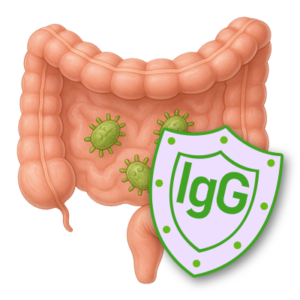
Shielding the gut: IgG toxin binders help reduce C. diff symptoms and improve probiotic tolerance.
Starting with IgG can also reduce the chances of feeling worse when you begin a probiotic. This is important because powerful probiotics can sometimes stir things up in your gut as they start crowding out harmful bacteria and restoring microbiome balance. By neutralizing toxins, IgG helps ease the transition to new probiotics.
For people with sensitive digestion or those recovering from antibiotics, this “calm first, restore second” approach can make a big difference. Once things have settled for a few days using a toxin binder, it’s easier to benefit from probiotic therapy without unnecessary symptoms.
If you’ve ever had trouble tolerating probiotics—especially after a C. diff infection—then this toxin binder might be the missing piece you’ve been looking for.
Choose Your Support Pack
Start with probiotic-focused support, or choose a broader approach with added toxin-binding action.
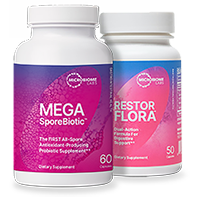
CD Probiotic Pack – Gut flora balance and digestive support during antibiotic use or gut challenges. Includes five clinically studied Bacillus strains plus Saccharomyces boulardii, a beneficial yeast researched for its role in supporting antibiotic-associated diarrhea and C. difficile – related diarrhea.
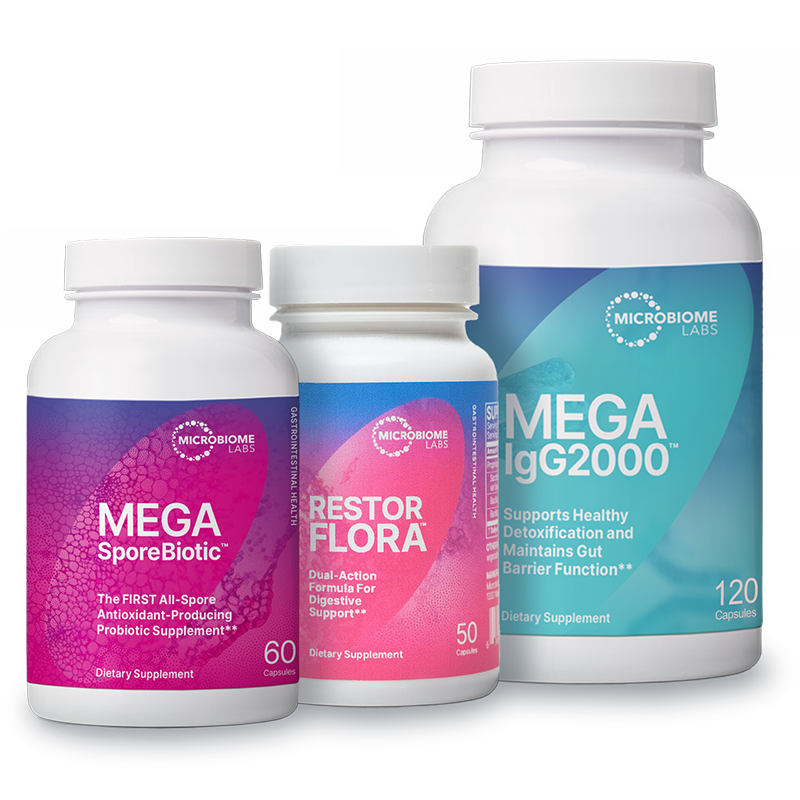
Gut Restoration Pack – Our most popular option for those focused on recovery after C. diff or antibiotic use. Combines the probiotics above with a targeted immunoglobulin (IgG) supplement that binds bacterial toxins in the gut and supports a healthier intestinal environment. Research suggests IgG can help reinforce the gut’s protective mucin layer — helping soothe irritation and promote greater digestive comfort during recovery.
We provide usage guides designed for C. diff recovery and ongoing product-use support for all customers.
Use coupon code RELIEF10 to save 10% — plus get free U.S. shipping
A Powerful Yeast Probiotic for Antibiotic-Associated Diarrhea
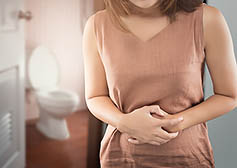
Sac. boulardii can help relieve antibiotic-associated diarrhea caused by C. diff.
S. boulardii is helpful in both the prevention and treatment of antibiotic-associated diarrhea (AAD) and colitis.
Sac. b. has unique benefits for C. difficile infections, including the prevention and treatment of antibiotic-associated diarrhea (AAD). Since Sac. boulardii is a hardy yeast and not a bacteria, it is not destroyed by antibiotic drugs like most other probiotics.
Sac. boulardii can help relieve diarrhea caused by C. diff. or antibiotic use.
S. boulardii Targeted C. diff Benefits:
- Supportive of a healthy microbiome during or after antibiotic use.
- Supportive of C. difficile bowel disorders in adults and children.
- Several clinical studies show that S. boulardii is helpful for support with gut disorders, especially antibiotic-associated diarrhea and C. difficile associated diarrhea6.
- S. boulardii secretes an enzyme that digests C. diff. toxin A and helps prevent the formation of C. diff. toxin B7.
- Also supportive in children with autism.
There are several probiotics on the market containing S. boulardii either by itself or as part of a multi-strain formula. Many holistic doctors prefer to combine S. boulardii with other species rather than take it by itself. This type of probiotic is meant for short-term use only. It may not be appropriate in some circumstances so check out the precautions below.
Probiotic Precautions
Probiotics are generally safe for adults and children and are very well tolerated by most people. But starting slowly may be needed for especially potent strains, of if you are sensitive to supplement or diet changes. Because probiotics are live organisms that may stimulate your immune system. So if you are severely immune-compromised, you should discuss probiotic use with a holistic or natural doctor before taking probiotic supplements.
If you start taking a new probiotic and experience any discomfort reactions such as gas, cramping, bloating or you just don’t feel well, simply reduce the amount you are taking. Once the symptoms subside you should be able to increase again. Discomfort is typically the result of disease-causing bacteria in your digestive system dying off as a result of taking the probiotic.
If you have allergies to yeast or if you’re dealing with a yeast infection, then choose a non-yeast probiotic. Yeast probiotics may not be advised by your doctor if you have an indwelling vascular catheter, a peripherally inserted central catheter (PICC line) or a central venous catheters (CVC). There have been reports of Sac b. possibly causing a blood infection through central venous catheters, likely caused by contaminated hospital staff hands 8. Be sure to consult with a Naturopathic doctor or a mainstream Medical doctor experienced with the use of probiotics if you have any questions.
Find Support for Your Recovery Journey
C. difficile can feel overwhelming, especially if you’re new to it or unfamiliar with natural options. We provide educational guidance, research-backed information, and carefully selected professional-grade products to support gut health.
Ready to take the next step? When you order from us, you’ll receive usage guides designed for those recovering from C. diff, along with my favorite Bacillus spore-based probiotics and toxin binder — plus 10% savings and free U.S. shipping using coupon code RELIEF10.
For a deeper dive, see my book C. Difficile Treatments & Remedies. It includes a detailed chapter on probiotics and a 3-step road-map to recovery I developed as an educational guide for those exploring natural approaches.
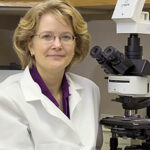
About the Author – Michelle Moore, BSc
Michelle Moore is a microbiologist, holistic health educator, and author of C. difficile Treatments & Remedies. With over 10 years of experience in pharmaceutical research and over 20 years in natural medicine, she helps people overcome C. difficile and other chronic infections naturally.
References
- Commissioned gastric model study by Silliker Food Science Center – Crete, IL
- Bacillus Coagulans GBI-30 (BC30) improves indices of Clostridium difficile-Induced colitis in mice. Fitzpatrick L, Small J, Greene W, Karpa K, Keller D. Gut Pathog. 2011; 3: 16.
- Bacillus coagulans GBI-30, 6086 limits the recurrence of Clostridium difficile-Induced colitis following vancomycin withdrawal in mice. Fitzpatrick L, Small J, Greene W, Karpa K, Farmer S, Keller D. Gut Pathog. 2012; 4: 13.
- Probiotics for Prevention of Clostridium difficile Infection. Mills J, Rao K, Young V. Curr Opin Gastroenterol. 2018 Jan; 34(1): 3–10.
- Secreted Compounds of the Probiotic Bacillus clausii Strain O/C Inhibit the Cytotoxic Effects Induced by Clostridium difficile and Bacillus cereus Toxins. Ripert G. et al. Antimicrob Agents Chemother. 2016 Jun; 60(6):
3445–3454. - Role of probiotics in antibiotic-associated diarrhea, Clostridium difficile-associated diarrhea, and recurrent Clostridium difficile-associated diarrhea. Surawicz CM, July 2018, J Clin Gastroenterol. 42 (Suppl 2): S64–70
- Saccharomyces boulardii protease inhibits Clostridium difficile toxin A effects in the rat ileum. Castagliuolo et al. Infect Immun. 1996 Dec;64(12):5225-32
- Catheter-related Saccharomyces cerevisiae Fungemia Following Saccharomyces boulardii Probiotic Treatment: In a child in intensive care unit and review of the literature. Serkan Atıcı Ahmet Soysal. Med mycol Case Rep. 2017 Mar; 15: 33–35. https://www.ncbi.nlm.nih.gov/pmc/articles/PMC5333505/
- Stein, T. (2005). Bacillus subtilis antibiotics: structures, syntheses and specific functions. Molecular Microbiology, 56(4), 845–857 https://onlinelibrary.wiley.com/doi/10.1111/j.1365-2958.2005.04587.x
- Caulier, S., et al. (2019). Overview of the antimicrobial compounds produced by members of the Bacillus subtilis group. Frontiers in Microbiology, 10:302. https://pmc.ncbi.nlm.nih.gov/articles/PMC6401651/
- Stein, T. (2020). Natural products produced by microorganisms: secondary metabolites of Bacillus subtilis. FEMS Microbiology Reviews, 44(1), 65–93.
Image credits: Bacteria combo graphic ©CDC and ©Lester Moore, Human tree ©freshidea/Fotolia, Supplement bottles ©Elenathewise/Fotolia, kids & dirt ©PHIL/CDC, C. diff. bacterium ©CDC, upset stomach ©Fotolia.com/Adiano.


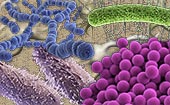
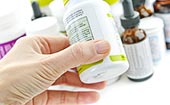

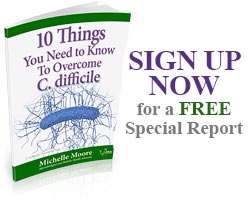 Fill in the form below to get our C. diff. tips newsletter and your free report “10 Things You Need to Know to Overcome C. difficile”.
We value your Privacy. Your email will be kept strictly confidential & secured. See our
Fill in the form below to get our C. diff. tips newsletter and your free report “10 Things You Need to Know to Overcome C. difficile”.
We value your Privacy. Your email will be kept strictly confidential & secured. See our 
